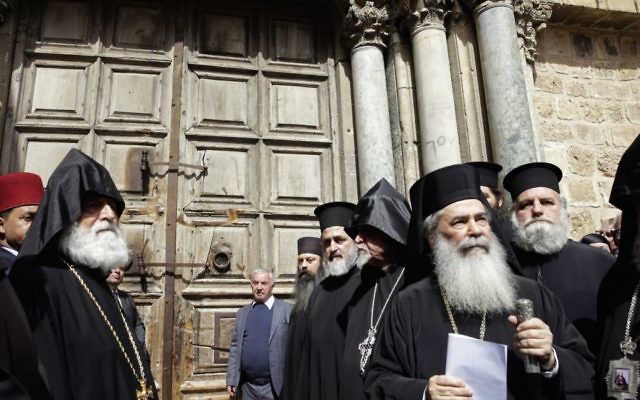Christian leaders protest in Israel
Christian leaders in Jerusalem have mounted the angriest protest against Israel of recent years, closing the Church of the Holy Sepulchre to express their fury.

CHRISTIAN leaders in Jerusalem have mounted the angriest protest against Israel of recent years, closing the Church of the Holy Sepulchre to express their fury.
Not stopping there, they evoked the Nazi era and suggested that Israel is treating Christians in ways that Jews were once treated.
New Israeli legislation, which impacts church land, has echoes “of laws of a similar nature which were enacted against the Jews during dark periods in Europe”, claimed the church leaders.
Their statement was signed by the Patriarch of Jerusalem, Theophilos III; the Custos of the Holy Land, Francesco Patton; and the Armenian Patriarch of Jerusalem, Nourhan Manougian.
They argue that Israel is carrying out a “systematic campaign against the churches and the Christian community in the Holy Land”, and showing a “flagrant violation” of the status quo that governs relations between church and state.
But Israeli leaders say they are confused by the stance of the church. The church’s grievance against Jerusalem mayor Nir Barkat relates to local taxes and he says it should be addressed in court.
And the politician they are angry with, Rachel Azaria, says she is just trying to protect normal Israelis.
The Christian leaders object to a new bill that would allow the state to appropriate land that churches have sold to private buyers.
In Israel, most homeowners build their houses on land that is leased to them, on the understanding that the lease is automatically renewed.
But the buyers of several parcels of church land aren’t respecting this precedent, and homeowners say that they are being asked for large sums if they want to stay there, and told they will otherwise lose their homes.
“This is to protect the residents of neighbourhoods in Jerusalem,” Azaria said of the legislation, talking to The AJN.
“The country will take the land from the buyers and they will get payment at a rate decided by the treasury.”
She insisted, “We don’t want to harm the rights of the church.”
Azaria’s bill, if endorsed by the government in discussions next week, will give the state the right to impose compulsory purchase orders on the land in question.
The state would appropriate the land from whoever purchased it from churches, at a rate fixed by the treasury but subject to appeal.
The legislation would have the impact of preventing churches from making future sales of land with leaseholders.
The closure of the Holy Sepulchre is a response to a local Jerusalem policy, as well as this legislation.
Barkat’s office is determined to collect unpaid council tax on church properties.
Churches say that the buildings are exempted according to longstanding agreements, but Barkat insists that church buildings are only exempted if they are actually used for worship, and taxes should be paid for others.
He insisted that there is “absolutely no change” to the principle of equality under the law for all faiths, but he insisted that when church buildings are put to everyday use they should pay taxes.
“Commercial buildings, such as hotels, places of commerce, and office space, however, are not exempt from municipal taxes, regardless of their ownership,” he argued.
“Unfortunately, debts on the commercial areas owned by the churches is in excess of 650 million shekels. We will no longer require Jerusalem’s residents to bear or subsidise this huge debt.”
Church leaders claimed: “These actions breach existing agreements and international obligations which guarantee the rights and the privileges of the Churches, in what seems as an attempt to weaken the Christian presence in Jerusalem.”
Their argument is generating little sympathy among Jewish Israelis, but there are some exceptions.
Talking to The AJN, Daniel Seidmann of the Terrestrial Jerusalem pressure group compared Barkat’s action to carrying out “microsurgery with a sledgehammer”.
Azaria, in his view, has an “admirable goal” of protecting homeowners, but is going about achieving it in a “reprehensible way”.
He said that the problem of churches selling land with leaseholders was a long time coming and should have been preempted and dealt with by Israel before it happened.
In his view Israeli authorities are at fault for failing to put protections for homeowners ahead of time, he said, not churches for making deals based on the rules at the time.
He believes that Israel should reach understandings with churches and developers that will protect homeowners – and be prepared to take a financial hit instead of expecting churches to do so.
Seidmann argued that by allowing tensions to grow with churches Israel has “totally unnecessarily shot itself in the foot”.
NATHAN JEFFAY

comments